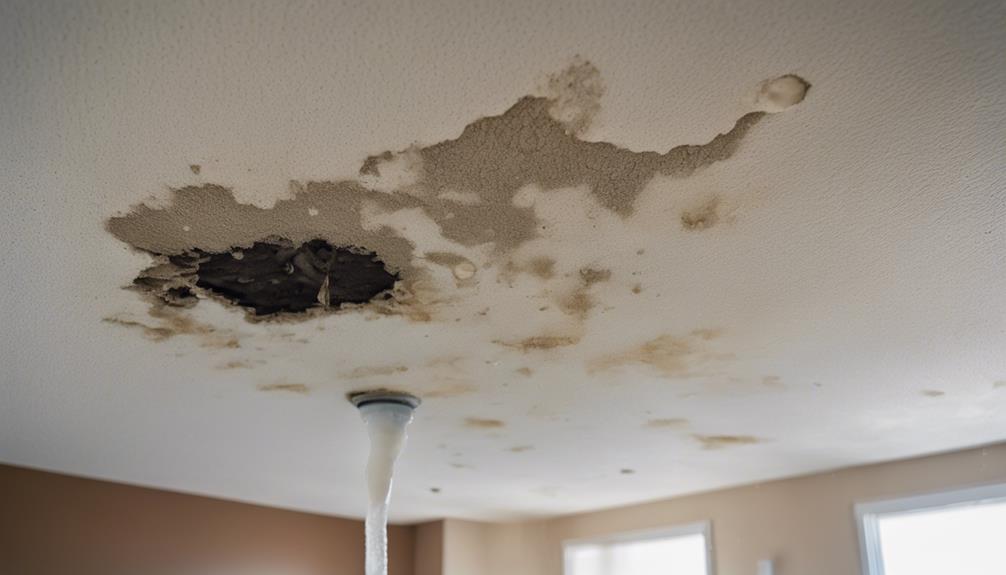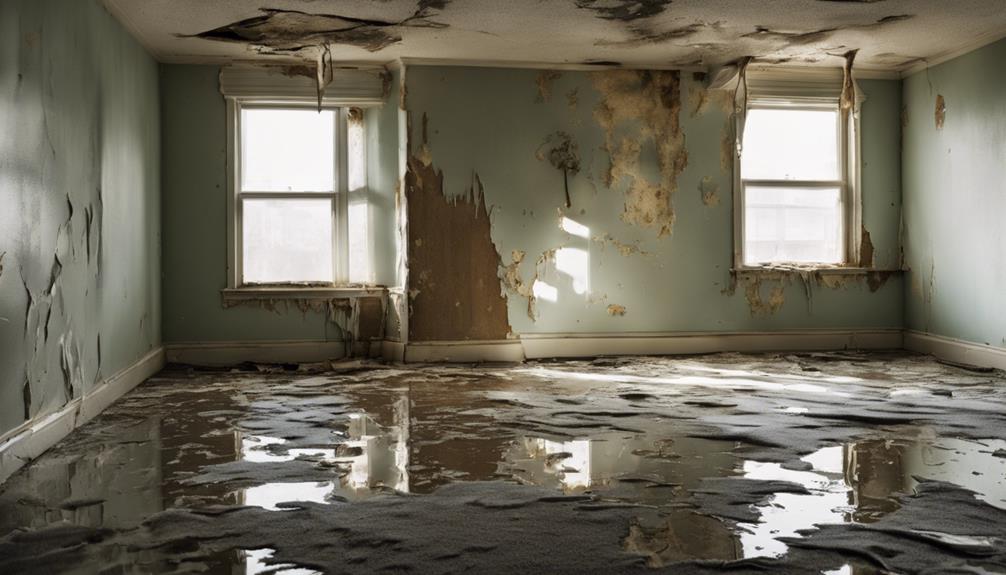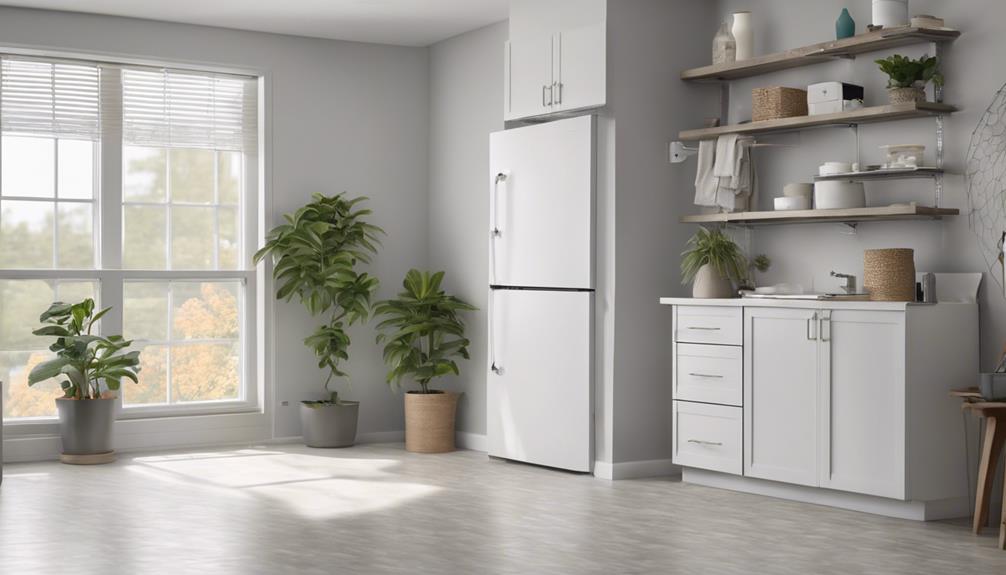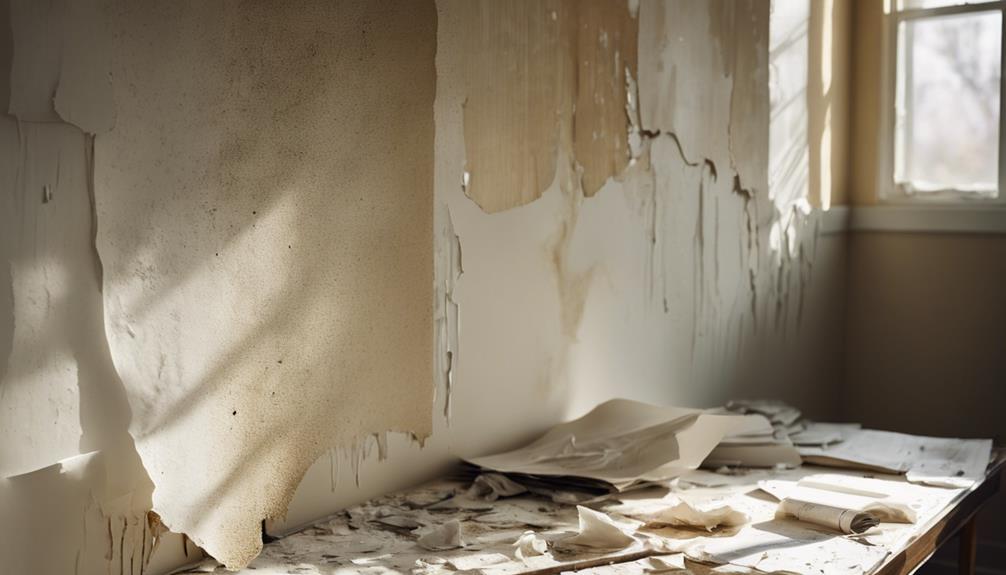
When it comes to condo water damage, who pays depends on the damage's origin. If the issue starts in your unit, you're generally responsible for repairs. However, if it stems from common areas, the HOA usually takes charge. Keep in mind that your personal insurance might cover unit-specific damages while the HOA's master policy may handle shared structures. It's essential to check your insurance for specifics since coverage can vary. Knowing about your responsibilities can save you unexpected costs and complications. Stick around to uncover more detailed insights on navigating these scenarios effectively.

Water damage in condominiums can create confusion about who's responsible for repairs. Typically, the condominium declaration, known as the CC&Rs, outlines these responsibilities. As a unit owner, you're usually responsible for water damage originating from your unit, like a burst pipe or an appliance leak.
However, if the damage affects common areas, the homeowners association (HOA) will handle those repairs. It's important to note that approximately 25% of home insurance claims involve water damage, highlighting the need for adequate coverage insurance coverage for water damage.
It's crucial to understand how your condo insurance policy works in these situations. Your HO-6 policy should cover personal property and improvements within your unit, while the HOA's master policy generally covers common elements.
Be aware that negligence, such as failing to maintain your plumbing, could shift repair costs to you, even if the damage impacts common areas.
Review both your personal and the HOA's insurance policies carefully to identify any exclusions. Neglect or routine maintenance issues often aren't covered, which means you could be responsible for significant repair costs.
Knowing your responsibilities and having the right insurance can save you from unexpected expenses and confusion during stressful times. Stay proactive to protect yourself and your investment.
When dealing with water damage in a condominium, understanding negligence and liability is essential for unit owners. When a leak occurs, you need to assess where it originated. If it's from your unit, you're likely responsible for repairs. However, if it comes from a common area maintained by the homeowners association (HOA), they may bear the liability.
To clarify your responsibilities, refer to the governing documents, including the Covenants, Conditions, and Restrictions (CC&Rs). Insurance adjusters often require proof of negligence to approve water damage claims. If routine maintenance wasn't performed, this could affect liability.
Here's a quick guide to help you assess negligence and liability:
| Aspect | Responsibility |
|---|---|
| Unit Owner Repairs | Responsible for damage |
| Common Area Issues | HOA likely responsible |
| Documentation | Essential for claims |
| Insurance Claim Approval | Requires proof of negligence |
| Legal Advice | Needed for complex cases |

Understanding your responsibilities regarding negligence and liability lays the groundwork for navigating insurance coverage in a condominium. The type of condo master insurance policy—bare walls, single entity, or all-in—determines your coverage extent for unit and shared structure damages. This can significantly impact your financial responsibility when water damage occurs.
Your homeowners insurance, typically an HO-6 policy, usually covers sudden or accidental water events, but it often excludes maintenance-related issues. It's crucial to review your individual insurance policies to identify any gaps in coverage. For instance, standard homeowners insurance doesn't usually cover flood damage, so you may need a separate flood insurance policy to protect against those risks.
Each unit owner contributes to the HOA Master insurance policy through assessments, ensuring common areas are covered. However, understanding the exclusions within your condo insurance—like neglect or wear and tear—is vital, as these can leave you vulnerable during water intrusion incidents.
Repair costs for water damage in condominiums can quickly add up, especially if they fall under the deductible limits of your HOA's insurance policy. If the costs are below the deductible, like in a scenario where your HOA's deductible is $10,000 and the repair expenses amount to $5,000, you'll need to cover that entire amount without any insurance assistance.
Homeowners must carefully review their association's declarations to understand whether they're responsible for losses that fall within these deductible limits. Colorado law, C.R.S. 38-33.3-313(6), allows associations to set policies regarding deductible responsibilities, which can significantly impact your financial obligations.
Additionally, be aware that certain exclusions in the HOA's insurance policy can further complicate repair costs. Common exclusions, such as mold or groundwater intrusion, leave you liable for those damages.
However, if the water damage is covered and exceeds the deductible, the association is responsible for filing an insurance claim to recover those repair costs, which will then likely be shared among unit owners through assessments.
Always stay informed to avoid unexpected financial burdens!

Preventing water damage in your condo starts with proactive maintenance. Regularly inspect appliances like washing machines and dishwashers. Check hoses for cracks and replace them every 2-5 years to prevent leaks.
Schedule annual checks of your water heater, especially since these usually fail after 12 years. Look for rust, leaks, and deterioration to ensure proper functioning.
Don't forget about your gutters and downspouts! Clean them regularly to prevent clogs that can lead to water pooling around your foundation, which could cause significant water damage.
Inside your condo, inspect plumbing under sinks and cabinets for any signs of leaks or rust. Address these plumbing issues promptly to mitigate potential damage.
Also, ensure the watertight seals of caulk around tubs, sinks, and toilets are intact. This helps prevent water seepage and subsequent damage to surrounding areas.
By taking these maintenance steps, you not only protect your home but also minimize the risk of needing to file an insurance claim for water damage.
Consider discussing these tips with your homeowner association to promote a community-wide approach to water damage prevention.
When you face water damage in your condo, starting the claims process can feel overwhelming.
You'll want to document the damage thoroughly with photos or videos before making any repairs.
Additionally, keeping a detailed record of your communications with the insurance company is crucial to ensure a smooth claims experience.
Documenting damage evidence is crucial for a successful claims process following water damage in your condo. Start by taking clear, detailed photographs or videos of all damage before making any repairs. This visual evidence is essential for your insurance claim.
Here's a quick guide to help you document effectively:
| Action | Details | Importance |
|---|---|---|
| Photograph Damage | Capture all affected areas and items | Provides visual evidence for claims |
| Maintain a Written Log | Record dates, representatives, and discussions | Keeps track of communications with insurers |
| Keep Damaged Items | Retain items until evaluated by the adjuster | Ensures all evidence is available |
| Review Your Insurance Policy | Understand coverage and exclusions | Helps you prepare necessary documentation |
When filing your claim, include the specific date and cause of the loss along with your insurance policy number. Proper documentation not only expedites the claims process but also strengthens your case for coverage regarding property damage. By following these steps, you can navigate the claims process with confidence.
Effective communication with your insurer is essential to navigate the claims process for water damage smoothly. When you file an insurance claim, it's crucial to provide documented evidence of the damage, including photos or videos.
Make sure you log all communications with the insurance company, noting dates, representatives' names, and discussion points. This will help clarify your case.
During your first notice of loss, be ready to share specific details like the date of the incident, the cause of loss, and your policy number. An insurance company is required to begin their investigation within 15 days after you submit your claim, and you should receive a claim number soon after.
If the water damage affects common areas or personal property, understanding your association's responsibilities is key. Coverage for water damage can vary, so knowing your owners responsibility is important.
Once an adjuster is assigned, it's beneficial to be present during their inspection. This way, you can clarify damage details and ensure all relevant information is included in the claims assessment. Clear communication will streamline the process and help you secure the compensation you deserve.

When it comes to condo water damage, understanding liability assignments is crucial for you as a homeowner.
Keeping thorough documentation of all related communications and incidents can significantly strengthen your position if disputes arise.
Additionally, knowing your insurance coverage and ensuring it complements your HOA's master policy can protect you from unexpected costs.
Navigating liability assignments in condominium water damage cases can be complex, but understanding the governing documents is key. These documents, like the CC&Rs, detail the responsibilities of both homeowners and the HOA. You need to differentiate between common elements and individual units, as this distinction determines who's liable for repairs. Generally, the HOA is responsible for common areas, while individual unit owners must handle damage within their spaces.
Here's a quick reference to help clarify liability assignments:
| Type of Damage | Responsible Party | Key Consideration |
|---|---|---|
| Common Elements | Homeowners Association (HOA) | HOA's obligations under governing docs |
| Individual Units | Unit Owners | Owner's liability unless specified otherwise |
| Negligence-Related | Depends on circumstances | Owner may be liable if their negligence contributes to damage |
| Claims on Liability | Varies by case | Legal advice can clarify specifics |
Negligence can significantly impact liability assignments, so consulting legal professionals can help clarify your responsibilities and rights. Understanding these elements is essential for effectively navigating claims related to water damage.
Documenting water damage thoroughly is vital for homeowners and associations alike, as it supports insurance claims and establishes the damage's extent. You should take detailed photographs and videos of the affected areas immediately. This documentation will be crucial for any discussions with your HOA or insurance adjuster.
Keeping a log of all communication with both the insurance adjuster and the HOA helps create a clear record of interactions and decisions. This log can clarify who's responsible for what and inform your understanding of your coverage. Historical documentation of previous repairs and maintenance can also assist in assessing current responsibilities.
It's essential to obtain written documentation from the insurance adjuster regarding their coverage decisions. This evidence can be invaluable if disputes arise later in the claims process.
Moreover, regular updates from your HOA about insurance coverage and individual responsibilities enhance transparency. This way, all homeowners stay informed about their obligations related to water damage claims, reducing confusion and potential disputes.
How does your Homeowners Association (HOA) handle water damage? Understanding the HOA responsibilities is crucial, especially when it comes to maintaining common areas like roofs and plumbing systems.
If water damage originates from these shared structures, the HOA's master insurance policy may cover the repair costs. However, it's essential to know the specifics of this policy, as coverage can vary widely—some may only cover the bare walls, while others might include everything.
For issues arising within your unit, you'll likely need to file a claim with your personal insurance. The condominium association typically handles claims related to common area damages, but clear communication with your HOA is vital.
Timely reporting of water-related incidents can expedite maintenance actions, potentially limiting further damage and costs.
Always stay informed about your HOA's policies and procedures to ensure you're prepared should water damage occur. This proactive approach can save you from unexpected expenses and provide peace of mind during stressful situations.
In California, if you're dealing with a water leak in your condo, you need to know your maintenance responsibilities.
Typically, you're responsible for issues within your unit, including plumbing issues. However, if the leak comes from common areas, your homeowner association may be liable.
Review your condo insurance and the association's governing documents to understand tenant rights and to file any damage claims for repair costs effectively.
A slab leak typically falls under the HOA's maintenance obligations, especially if it involves the plumbing system serving multiple units.
You should check your association's governing documents to clarify responsibilities.
Common area insurance often covers these leaks, but it's vital to implement leak prevention strategies.
Also, be aware of tenant liability issues, as individual unit owners might still face costs.
Always follow emergency response protocols for prompt reporting to minimize further damage.
When it comes to leaks from upstairs neighbors, insurance coverage varies based on your policy.
You'll want to check your policy coverage for leak detection and maintenance responsibilities. If you face neighbor disputes, document everything for potential insurance claims.
Emergency repairs might be necessary, but liability issues can complicate things. Understanding your tenant rights is crucial, as your coverage may not extend to maintenance-related leaks.
Always communicate with your insurance provider for clarity.
When you're dealing with a water leak, understanding the causes is crucial.
Typically, condo maintenance responsibilities fall on you as the unit owner, especially if it's due to your plumbing. Familiarize yourself with tenant rights, HOA rules, and relevant insurance policies.
If the leak breaches building codes or plumbing regulations, that could shift repair costs.
Always document the situation to clarify responsibilities and ensure timely repairs and coverage.
In dealing with condo water damage, understanding your responsibilities is key. Whether it's your negligence or the HOA's, knowing who pays can save you stress and money. Always check your insurance coverage and stay proactive with maintenance to prevent future issues. If disaster strikes, follow the claims process carefully and seek legal advice if needed. By staying informed, you can navigate the complexities of water damage and ensure you're covered when it matters most.